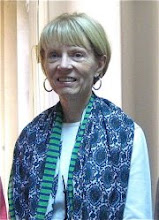The Legend Goes On
 Romantic dreams continue at Rick’s Café in Casablanca. For lunch I had a glass of Moroccan vintage red wine, lamb kebabs, and an Italian coffee in a renovated Ottoman home on the edge of the old city (medina) to the music of Andy Williams, Nat King Cole, Frank Sinatra, and other American sentimental balladeers. It was like right out of a movie set. Tinted brass palm trees bordering mirrors behind the bar. Small palms below the pointed arches of the arcade surrounding the court, rising a story and open to the sky through a large octagonal skylight, covering the open space. Black marble topped tables and wicker chairs with fringed brass lanterns, a wooden mashroubiyya oriental screen, a discretely framed poster pointing the way to Timbuktu (in English and Arabic). A grand piano with small, beige Victorian fringed lamp on top for sultry Sunday afternoon jazz sessions. Such are the furnishings with formal table settings. Although the restaurant doesn’t serve caviar as in the movie, it does have an oyster bar on Saturday evenings and other excellent food.
Romantic dreams continue at Rick’s Café in Casablanca. For lunch I had a glass of Moroccan vintage red wine, lamb kebabs, and an Italian coffee in a renovated Ottoman home on the edge of the old city (medina) to the music of Andy Williams, Nat King Cole, Frank Sinatra, and other American sentimental balladeers. It was like right out of a movie set. Tinted brass palm trees bordering mirrors behind the bar. Small palms below the pointed arches of the arcade surrounding the court, rising a story and open to the sky through a large octagonal skylight, covering the open space. Black marble topped tables and wicker chairs with fringed brass lanterns, a wooden mashroubiyya oriental screen, a discretely framed poster pointing the way to Timbuktu (in English and Arabic). A grand piano with small, beige Victorian fringed lamp on top for sultry Sunday afternoon jazz sessions. Such are the furnishings with formal table settings. Although the restaurant doesn’t serve caviar as in the movie, it does have an oyster bar on Saturday evenings and other excellent food.It was great fun, although quite a contrast to the nearby medina, with its messy streets, scruffy buildings, divided between areas of habitation and small shops. Only human labor or scooters move items or people through the cobbled streets within the ramparts entered through the old city gates. An institute in Helsinki, Finland (the World Institute for Development Economics Research–WIDER), has taken up trying to measure wealth as well as income. Income is the amount of money a nation or household receives in a year. Wealth is the store of assets it has accumulated over its life so far, minus its debts. Wealth is amassed much less equitably than income. More than half of it is held by just 2% of the world’s adults. That helps account for the contrasts I see here.* I walk a bit down the corniche (coast road) from my hotel and see just beneath the bordering cement wall a discreetly hidden shanty town, covered by mats and tarps, held in place by rocks and weighted cans and plastic bottles. A dirt path indicates the entrance. Other squatters may have taken up residence in the remains of an abandoned building in a nearby area in the cliff below the wall, where lines of drying laundry can be recognized upon closer glance into the interior. Scores of young adolescent boys are playing football (soccer) on the brown sandy beachfront. No women unless some young girls approach for a stroll with their fiancées or husbands, or a couple of older women, who are sitting on the ground and have constructed makeshift beverage stands on paths to the beach, trying to make a few dirhams. One has her young daughter, finishing a packet of cookies, by her. There are two McDonalds along the corniche in the other direction (offering Chicken Mythic, one has a drive through), along with the Grand Mosque of Hassan II and a foundation constructed by the Saudis with large mosque, Islamic library, and palace for the Saudi king when he visits.
Today is Friday, and by 1 PM cars had narrowed the road by parking en masse on parts of the corniche. People were going to the mosques. Women can pray at home, but it is obligatory for men to pray in the mosque for the Friday community prayer. Children begin praying with the parent of the same gender identification when they are seven years old. Casablanca has a lot of mosques, and people were heading for the one that was the closest. Morocco is 98-99% Muslim and remains an ardently Islamic country in name and practice.
*Of course, matters can always be more complicated than they appear at first glance. Many people in poor countries have next-to-nothing; but quite a lot of people in rich countries have less than that, according to The Economist. The Nordic countries, in particular, seem to thrive without much personal wealth. The Finns, for instance, are entitled to a generous state pension and other largesse, which counts for more than a nest egg to call one’s own (The Economist, December 9, 2006, p. 79)


0 Comments:
Post a Comment
<< Home